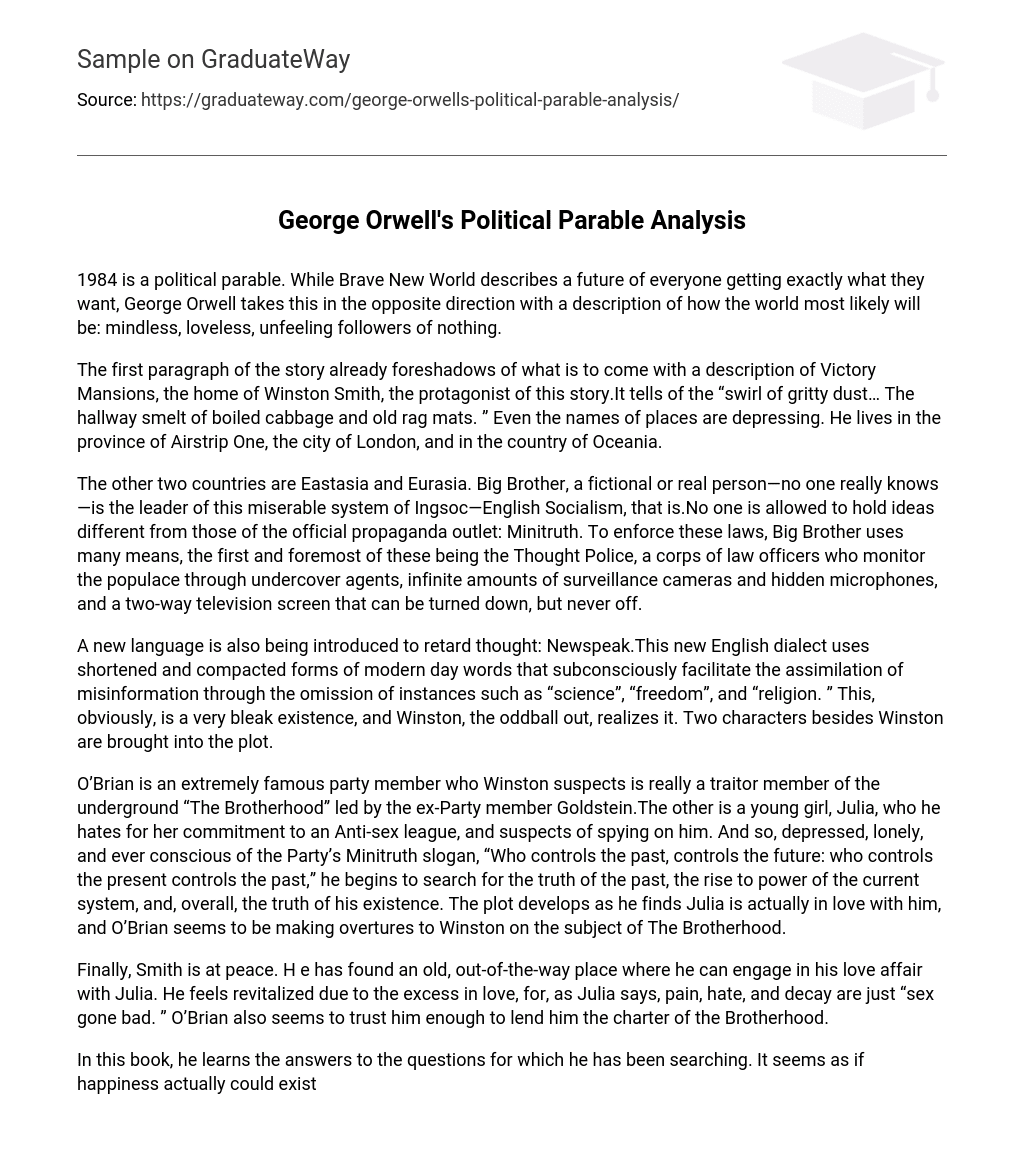The book 1984 by George Orwell is a political parable that presents a contrasting view to the future portrayed in Brave New World. While the latter envisions a society where everyone’s desires are fulfilled, Orwell depicts a dystopian world characterized by mindless, loveless individuals devoid of any sense of purpose or allegiance.
The first paragraph sets the stage for what is to come in the story by describing Victory Mansions, the residence of Winston Smith, the tale’s protagonist. It highlights the presence of “gritty dust” and an odor of boiled cabbage and old rag mats in the hallway. The names of the locations themselves, such as Airstrip One, London, and Oceania, contribute to the overall dreary atmosphere.
The two other countries in this miserable system are Eastasia and Eurasia. Big Brother, a leader who could be fictional or real, leads this system of Ingsoc which stands for English Socialism. It is forbidden for anyone to have different ideas from what the official propaganda outlet, Minitruth, promotes. To enforce these laws, Big Brother uses various methods, with the Thought Police being the most significant. The Thought Police consist of law officers who monitor the population through undercover agents, extensive surveillance cameras, hidden microphones, and a two-way television screen that can be dimmed but never turned off.
Newspeak is a new language that hinder thought. It uses shortened and compacted versions of modern words to unconsciously promote the assimilation of misinformation by omitting words like “science”, “freedom”, and “religion”. Winston, the outlier, recognizes this grim reality. Two other characters are also introduced to the story.
O’Brian, a renowned party member, is suspected by Winston of being a traitor in the underground group known as “The Brotherhood”, which is led by Goldstein, a former party member. Winston despises Julia, a young girl who is dedicated to the Anti-sex league and suspects her of spying on him. Feeling depressed, lonely, and constantly aware of the Party’s Minitruth slogan – “Who controls the past, controls the future: who controls the present controls the past,” Winston embarks on a quest for the truth about the past, the rise of the current system, and his own existence. The plot thickens as Winston discovers Julia’s feelings of love towards him and O’Brian seems to be hinting at involvement with The Brotherhood.
Smith has finally found a tranquil spot where he can indulge in his romance with Julia. This secluded location has given him a renewed sense of vigor, thanks to the overwhelming power of love. According to Julia, any negative emotions such as pain, hatred, and deterioration are merely manifestations of failed sexual encounters. Moreover, O’Brian’s trust in Smith is evident as he entrusts him with the documentation of the Brotherhood.
In this book, the main character uncovers the solutions to his enduring questions and realizes that happiness may be achievable in actuality. Sadly, his aspirations are quickly crushed when he and his loved one are unexpectedly assaulted by a group of assault troopers.
Upon arrival at jail, the individuals are promptly separated and attention turns to Winston. It becomes evident that his life has come full circle as he now finds himself in a position lower than before. This realization dawns on Winston when he discovers that both the shopkeeper who betrayed him and O’Brien are members of the Thought Police – marking his initial encounter with them. Consequently, Winston endures torture until he reluctantly makes a false confession of being a traitor.
Julia quickly becomes disloyal and he ends up following suit. The interesting aspect is that while imprisoned, he discovers the genuine essence of existence: The Party. The Party’s authority is absolute, and historical facts hold no significance. History is malleable.
If Big Brother declares that two plus two is five, then it is indeed five. If the Party proclaims that Oceania is in conflict with Eurasia, then it has perpetually been at war with Eurasia. The narrative concludes with Winston being set free, finding solace in a pub where he indulges in excessive drinking, utterly shattered. This outcome doesn’t come as a shock to him, as he foresaw it and understood that his skepticism had sealed his fate from the moment it emerged.
The book explores a warning of a potential future, similar to the warnings in Brave New World and Anthem. It depicts a population controlled by a privileged minority through extensive propaganda, causing truth to become indistinguishable. This breakdown in trust leads to reliance solely on authorities, ultimately creating Orwell’s nihilistic world.
Overall, the characters in the book are skillfully developed and believable. Smith starts off as a depressed person but evolves into a fully developed individual before being ultimately marginalized and discarded. Similarly, Julia seems to follow a similar path and ends up in a predicament like Winston’s. Interestingly, I found that this book strangely resonated with my Christian beliefs.
While the main theme of the text is a cautionary message directed towards future governments and their respective populations, there is also a sub-theme emphasizing the necessity of placing absolute trust in a higher power in order to endure. Without this belief and faith, individuals are destined to suffer and be subjected to humiliation. Although this interpretation may deviate from the conventional, it becomes comprehensible upon reflection. In general, Mr.
Orwell effectively conveys his message in a straightforward and convincing narrative style, as demonstrated by the clear writing and vivid descriptions found throughout his book. I highly recommend this thought-provoking novel, which presents a distinct concept similar to other futuristic works. What sets it apart is that Orwell wrote it from his own time, making it appear more plausible.
He is unimpressed with communism, socialism, or any related form of government as seen in Animal Farm. Overall, it is an excellent book that I wholeheartedly recommend.





